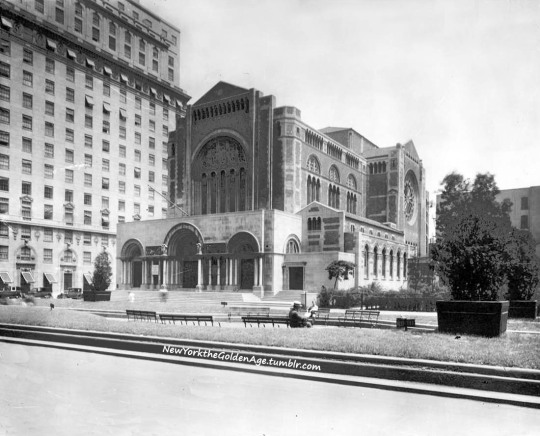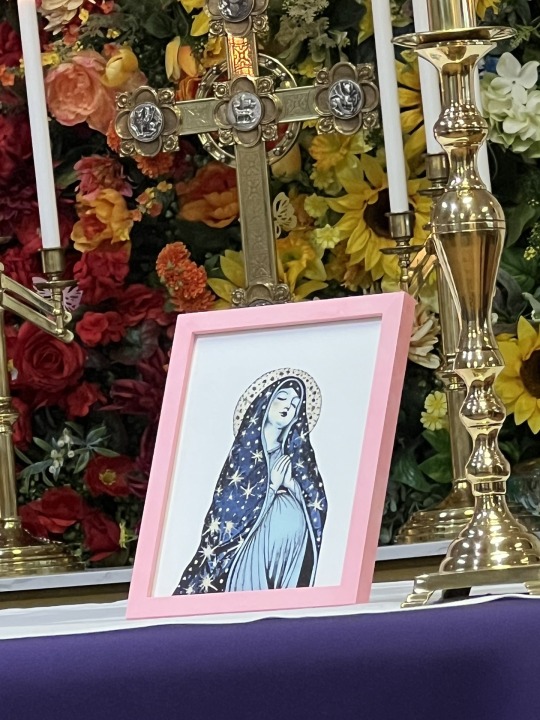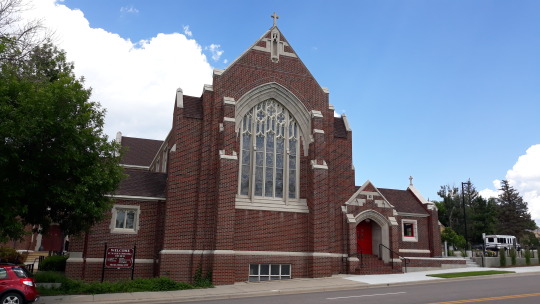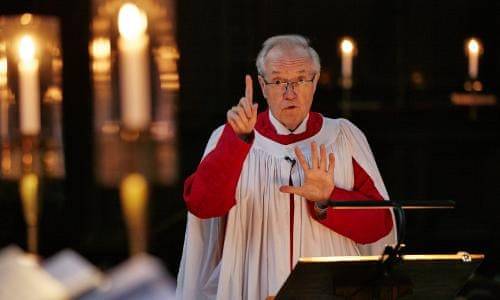#Episcopal Church
Text

St. Bartholomew's Episcopal Church on Park Avenue between 50th and 51st Streets, early 1920s. It is the burial site of, among others, Lillian and Dorothy Gish.
Photo: NY Historical Society/Getty Images/NY Daily News
#vintage New York#1920s#St. Bartholomew's#St. Bart's#Byzantine Revival#Episcopal church#church#Lillian Gish#Dorothy Gish#Park Avenue#historic churches#vintage NYC
60 notes
·
View notes
Text
Gene Robinson was made a bishop in the Episcopal Church, the first openly-gay bishop, ever. Robinson is quick to point out that there have always been gay bishops in the Episcopal Church. "There have been a lot of us, let's just be clear," he said. "I'm just the first openly-gay one."
This past November marked the 20th anniversary of him being made a bishop. 20 years ago he was called the most dangerous man in the Anglican Church and wore a bullet-proof vest because of the many threats against him.
"It's an awful thing to stand in a pulpit and encourage people to live authentic lives when you know you're not being authentic. It's why I felt God called me out of the closet."
The next gay bishop in the Anglican Church wouldn't come until 2010 when Mary Glasspool became the first opely lesbian woman to be consecrated a bishop in Anglican Communion.
Today there are currently 5 openly-gay bishops in the Anglican Church.
46 notes
·
View notes
Text
When was it? 1979?
Someone unknown had messed with “my” Book of Common Prayer. Without warning we were suddenly expected to exchange the Peace with our fellow congregants. Huh.
For years afterward I’d look down at this point in service, my failing to participate a silly, silent protest.
When I returned to the Church in my late fifties I found that exchanging the Peace brought me a renewed sense of joy and belonging.
And so these many years later I extend to all of you who have been kind enough to follow me this heartfelt wish:
May Peace be with you.
29 notes
·
View notes
Text

Blessed Mother Mary at my church 💗
#episcopal#episcopalian#episcopal church#christian#christianity#progressive christian#progressive christianity#pro lgbt#mother mary
23 notes
·
View notes
Text
Tuesday, 2 January 2024
I went to Grace Cathedral on Christmas, but didn't partake in communion because they adhere to the tradition of everybody sipping the Eucharistic wine from a common chalice. Yes, they wipe the chalice after every person, but I wasn't comfortable with that. So, I opted to receive a blessing instead of the Sacrament.
I didn't go this past Sunday because I wasn't feeling well. And I learned today that I have covid, so I'm REALLY glad I didn't go. Hopefully, I'll be well enough to go again by February. If the projections are accurate, I could go back in as little was two weeks, but I think I should play it safer than that. I might even wait until Lent.
The Episcopal Church in particular, and the Anglican tradition in general, seems to pride itself on the so-called Three-legged Stool of Scripture, Tradition, and Reason. In a world where the covid pandemic is still very much in progress, it's only the state of emergency that has ended, there isn't any Reason to the idea of adhering to the Tradition of the shared chalice. So long as this is the case in any church, I will refuse communion.
Reason knows when Tradition must retire.
Here ends the lesson.
18 notes
·
View notes
Text

Heaven as Described by the Saints 🙏🕊️✝️
https://owlcation.com/humanities/What-Is-Heaven-Like-Lets-Open-the-Door
#Christianity #Christ #Jesus #CatholicTwitter #Catholicism #Catholic #EpiscopalChurch #AnglicanChurch #BaptistChurch #NYC #Brooklyn #Queens #Bronx #StatenIsland #LongIsland #SundayService #WashingtonDC #USA
#Christianity#Christ#Jesus#Catholicism#Episcopal Church#Anglican Church#Baptist Church#Sunday Service#God#Heaven#Saints
12 notes
·
View notes
Text
In 2023, Let's Remember that Jesus Was a Poor Man

I’ve been thinking alot about this picture lately that I first came across online probably 4 or 5 years ago, you can view it at the start of this blog post. It’s a black and white photo of a mule drawn covered wagon. Painted on the wagon cover is the phrase, “Don’t laugh folks, Jesus was a poor man.” This picture was taken in 1968 as part of The Mule Train. The Mule Train was a train of mule drawn wagons that rode together from Marks, Mississippi, one of the poorest areas in all of the USA at the time, to Washington DC as an act of protest to highlight the need for poor people, especially poor children, to have their basic needs met. The Mule Train was part of the original Poor People’s Campaign which Martin Luther King Jr. was a leader in before he died. Marks was populated predominantly by poor Black sharecroppers who were descendents of enslaved people, which was no accident either. Disproportionate Black poverty was and is a feature of US racial capitalist society, which was built by enslaved Black people, and became prosperous by the total theft of value generated by their labor while living in bondage. Much like Southern Black people in the USA in 1968, Jesus too lived under constant state repression and under oppressive social regimes as a Palestinian Jew living under Roman Imperial occupation.
I love the implication of the claim that this wagon makes. The idea that the God of the universe became human and lived, walked, worked, loved, ate, cried, laughed, and died amongst us is earth-shatteringly profound. Yet, when this Creator of everything that was, is, or will be became a human-being, God chose not to be born into a wealthy, aristocratic family. God chose to become a poor man living under occupation. Therefore, how our societies and economies treat poor people is reflective of how our societies and economies would treat God if God became human in our day.
At my lovely Episcopal church in Dallas last night, sitting in the pew, participating in our lovely Lessons and Carols liturgy that we always do the first Sunday after Christmas, I heard this passage, John 1:1-14, like I’d heard it for the first time. In this passage, the author of the text refers to God as “the Word” and “The Light” which are common Biblical titles for God. I, however, couldn’t escape this idea of “what if these titles, the Word and the Light, were replaced with the phrase “the Poor Man”? After all, our Mule Train drivers named Jesus as a poor man. How might we hear this passage differently in our time? In this place?”
Therefore, I invite you to read this New Revised Poor Man edition of John 1:1-14 below, adapted from the Common English Bible. I took the liberty of abandoning this motif a few times for clarity.
John 1:1-14 - Common English Bible
In the beginning was the Poor Man
and the Poor Man was with God
and the Poor Man was God.
The Poor Man was with God in the beginning.
Everything came into being through the Poor Man,
and without the Poor Man
nothing came into being.
What came into being
through the Poor Man was life,
and the life was the light for all people.
The Poor Man shines in the darkness,
and the darkness doesn’t extinguish the Poor Man.
A man named John was sent from God. He came as a witness to testify concerning the Poor Man, so that through him everyone would believe in the Poor Man. He himself wasn’t the Poor Man, but his mission was to testify concerning the Poor Man.
The true Poor Man that shines on all people
was coming into the world.
The Poor Man was in the world,
and the world came into being through the Poor Man,
but the world didn’t recognize the Poor Man.
The Poor Man came to his own people,
and his own people didn’t welcome him.
But those who did welcome him,
those who believed in his name,
he authorized to become God’s children,
born not from blood
nor from human desire or passion,
but born from God.
The Poor Man became flesh
and made his home among us.
We have seen his glory,
glory like that of a father’s only son,
full of grace and truth.
When I read this adapted passage, the first thing that it reminds me of are two verses from John 12:7-8 CEB:
““Leave her alone,” Jesus replied. “It was intended that she should save this perfume for the day of my burial. You will always have the poor among you, but you will not always have me.”
This passage comes from an absolute favorite Gospel story of mine, the raising of Lazarus followed by the story of Mary and Martha and the perfume. In the story, following Jesus’ miracle of raising Lazarus from the dead, Lazarus, Mary, Martha, Judas Iscariot, and Jesus share a meal together in Mary, Martha, and Lazarus’ home. In the story, while Martha is serving the table, Mary gets up and pours a very expensive bottle of perfume (worth a year’s wages) over Jesus’ head, anointing him, and then wipes his feet with her hair. The others are outraged by this act, but Jesus understands it as a holy sign of devotion from his dedicated follower, Mary, who seems to know that Jesus is quickly approaching his death.
When Jesus says “You will always have the poor among you, but you will not always have me” it sounds kind of dismissive of the plight of the poor. However, if you are familiar with the full text of the Gospels and Jesus’ work and ministry then you understand that Jesus cares more for the poor and the outcast than any other group in ancient Palestinian society.
If we interpret John 12:7-8 through the lens of Jesus being the Poor Man then the verses take on an entirely different meaning. If Jesus is leaving his humanly and earthly life, but the poor are staying, that means that Jesus is staying, embodied in the lives of the poor. It follows that, if we want to know how to best worship God on this side of the eschaton then we need look no further than the homeless person on the side of the street asking for money. We need look no further than the single mother working 70 hours a week to keep her children fed and housed. We need look no further than the Central American refugees at our southern border fleeing persecution and immiseration, seeking a better life in the USA.
The Poor Man, the Peasant King, is with us everyday. Jesus lives in our hearts but he also lives in the places furthest out of the eyes of mainstream society, where poor and working people struggle to meet their basic needs under the oppressive thumb of a patriarchal, nativist, racial capitalist world system. As we enter into 2023, let us boldly worship God by working towards making a world where all unjust systems and institutions are torn down and the world is remade for the perpetual worship of our Creator, meaning a world where all poor people are fed, cared for, loved, and free.
#Jesus#Poverty#Capitalism#racial capitalism#2023#Happy New Year#progressive Christian#liberation theology#democratic socialism#socialism#anglican#anglicanism#episcopalian#episcopal church
102 notes
·
View notes
Text

St. Mark's Episcopal Church, Casper, Wyoming https://midwesternartlovertraveler.tumblr.com/
#my own photo#architecture#gothic architecture#gothic revival#neogothic#church#episcopal church#protestant episcopal church#anglican communion#st mark's episcopal church#casper#casper wyoming#wyoming#usa#united states of america
12 notes
·
View notes
Text

Episcopal Church in Keyport, NJ, US
American vintage postcard
#nj#old#postcard#postkaart#vintage#american#briefkaart#postal#ansichtskarte#church#ephemera#episcopal#photography#keyport#photo#episcopal church#postkarte#tarjeta#historic#sepia#us american#carte postale
5 notes
·
View notes
Text
It’s Lessons and Carols week in many churches, especially in the Anglican communion. It’s the one time of year we anticipate his arrival.
Jesus, you might ask?
No.
David Willcocks.

For he wrote the filthiest, fattest, most majestic organ chord of all time in his arrangement of “O Come All Ye Faithful”, that every chorister cannot help but put their entire ass into when it comes around.

4 notes
·
View notes
Text
Grace Episcopal Church-Clayton, Alabama
This Gothic Revival Church was completed in 1876 on land donated by Henry DeLamar Clayton, the town’s namesake and former president of the University of Alabama. It was placed on the National Register of Historic Places in 1995.

View On WordPress
4 notes
·
View notes
Video
youtube
Hymn of the Cherubim - Pyotr Ilyich Tchaikovsky - Extended

Hymn of the Cherubim
https://youtu.be/y9p0-NSirQA?si=duAMNCwEIuEjTFT7 via @YouTube
With two wings they covered their faces, with two they covered their feet, and with two they flew.
5 notes
·
View notes
Text
king henry the viii’s punishment in hell is just a constant feed of the innumerable female priests, feminist biblical criticism study groups and lesbian weddings held in the church he invented as he sobs into his hands like ‘what have i done!?’ and i for one think that’s beautiful.
#all of these are things i’ve personally experienced at multiple anglican churches and anglican high school#we exist solely to spite our founder#christianity#episcopal church#anglican church#anti monarchy#pro women#henry the eighth#the divine comedy#hell
21 notes
·
View notes
Text
Feel so fucking alone.
This morning, I attended one of the listening sessions that are a part of the rector search process at St. P’s. They give us 4-5 question prompts about what we want in a new rector, what keeps us at the church, what are the church’s values and mission, etc. At one point, I said something that was probably controversial…I didn’t say it like this, but basically that I can’t stand P’s (interim priest) sermons and don’t want to come to church anymore because of the lack of pastoral message. He’s an academic, which I can appreciate. But I don’t want to hear a freaking theological conference paper every Sunday.
Got some push back from one the search committee members. Like maybe I could have said it more gracefully/less harshly, but I wanted to make it clear. I do not want this complete lack of pastoral message in a new rector. J was so, so good at it and I learned so much from him. E is too, but she preaches maybe once a month since stepping down from her role. So she is barely there anymore.
I’m trying to remind myself that P is not permanent, that I just need to make it through one more year. But I have felt such a lack of pastoral/spiritual care since P arrived, which has already been a fucking year. I miss J so much. So fucking much. I viewed St. P’s as my home, my safety. And now I’m not sure anymore. Feel so lost, so alone.
#St. P's#episcopal church#talks with J#people always leave#i am so alone#rejection#so fucking tired of fighting#nothing is safe#angriadm
5 notes
·
View notes